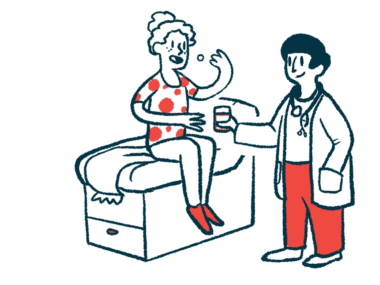Kyverna planning to launch Phase 3 trial of KYV-101 in MG patients
Positive results from study could lead to approval as a treatment for disease
Written by |

Kyverna Therapeutics is planning to launch a Phase 3 clinical trial testing its experimental cell therapy KYV-101 in people with myasthenia gravis (MG).
The announcement follows an end-of-Phase 2 meeting between Kyverna and the U.S. Food and Drug Administration (FDA). According to the company, the FDA has aligned with plans to move KYV-101 into Phase 3 testing. Phase 3 trials are large studies designed to test if treatments are effective. This study is expected to be registrational, meaning that positive results could form the basis for applications seeking the approval of KYV-101 as a treatment for MG.
Kyverna said it will share more details about the trial, including how many people will be enrolled and what criteria will be assessed as trial goals, later this year.
MG is an autoimmune disease in which self-reactive antibodies disrupt the communication between nerve and muscle cells, resulting in symptoms of muscle weakness and fatigue. Antibodies are immune proteins made by B-cells, a specialized type of immune cells.
KYV-101 gains fast-track designation
KYV-101 is a CAR T-cell therapy designed to deplete B-cells. In this therapy, T-cells — another type of immune cells that are capable of killing other cells — are collected from patients, then engineered in a lab to carry a chimeric antigen receptor, or CAR. This man-made receptor directs T-cells to attack cells that have a specific target. In the case of KYV-101, that target is CD19, a protein found on B-cells. The modified T-cells are then infused back into the patient to attack and destroy B-cells, which is expected to ultimately lower the levels of MG-driving antibodies and, as a result, ease disease symptoms.
The FDA has granted KYV-101 fast track and regenerative medicine advanced therapy designations, which aim to expedite the development of treatments that have the potential to improve care for serious medical conditions. In Europe, KYV-101 has been granted orphan drug designation, which provides additional incentives for companies developing new treatments for rare diseases.
“We are pleased to report an exceptional start to the year, marked by rapid execution against our focused strategy to advance development of KYV-101 and build Kyverna into a robust clinical and commercial-ready organization,” Warner Biddle, Kyverna’s CEO, said in a company press release. “Importantly, we have now [agreed] with the FDA on the registrational pathway for [KYV-101 in MG], laying the foundation for accelerating our potential first-in-class neuroinflammation franchise.”
Kyverna is also sponsoring an open-label Phase 2 study called KYSA-6 (NCT06193889) to test KYV-101 in 20 adults with MG who are positive for antibodies against the acetylcholine receptor (AChR) or the muscle-specific kinase (MuSK), the most common types of MG-driving antibodies. As of March, the ongoing study was still recruiting participants at sites in the U.S. and Germany.
The main goals of the Phase 2 trial are to assess the safety of KYV-101 and to see how the therapy impacts the scores of the MG Activities of Daily Living scale, a standardized tool that assesses the degree to which MG symptoms impact patients’ day-to-day lives. Interim data from KYSA-6 trial are expected in the second half of the year.




Leave a comment
Fill in the required fields to post. Your email address will not be published.